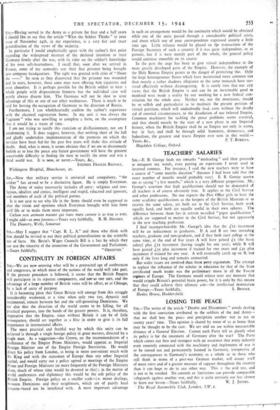SIR, —Having served in the Army as a private for four
and a half years I should like to say that the article "What the Soldier Thinks" in your :ssue of November 24th, in my experience, is a very fair and exact generalisation of the views of the majority.
In particular I would emphatically agree with the author's first point regarding the widespread mistrust of the declared intention to treat Germany firmly after the war, with its rider on the soldier's knowledge ef his own soft-heartedness. I recall that, soon after we arrived in France, some of my comrades saw their first prisoner being brought into company headquarters. The sight was greeted with cries of "Shoot the —." .So soon as they discovered that the prisoner was wounded and in tears, however, those same men were offering him cigarettes and even chocolate. It is perhaps possible for the British soldier to treat a whole people with dispassionate firmness but the individual case will nearly always disarm him. The Germans will not be slow to seize advantage of this or any of our other weaknesses. There is much to be said for leaving the occupation of Germany to the direction of Russia. Furthermore, I can wholeheartedly confirm the author's experience with the electoral registration forms. In my unit it was always the " agitator" who was unwilling to complete a form, on the assumption that it would be a waste of time.
I am not trying to justify this cynicism or disillusionment, nor am I condemning it. It does suggest, however, that nothing short of the full and gladly undertaken implementation of the promises on which the services have been fed for the past five years will shake this attitude of doubt. And, what is more, it seems obvious that if we are so disastrously foolish as to lose the peace any future government will have the greatest conceivable difficulty in finding the men to rectify the error and win a third world war. It is new, or never.—Yours, &c.,
Withington Hospital, Manchester, 20.
STEPHEN FRANCIS BAGNALL.


























 Previous page
Previous page